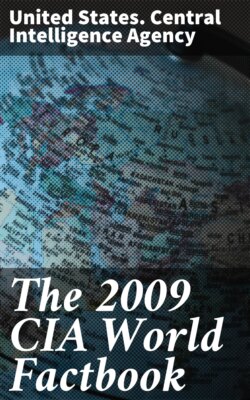Читать книгу The 2009 CIA World Factbook - United States. Central Intelligence Agency - Страница 546
На сайте Литреса книга снята с продажи.
NA
ОглавлениеInternational organization participation:
FZ, ITUC, PIF (associate member), SPC, UPU, WMO
Diplomatic representation in the US:
none (overseas lands of France)
Diplomatic representation from the US:
none (overseas lands of France)
Flag description:
two narrow red horizontal bands encase a wide white band; centered on the white band is a disk with a blue and white wave pattern on the lower half and a gold and white ray pattern on the upper half; a stylized red, blue, and white ship rides on the wave pattern
note: the flag of France is used for official occasions
Government - note:
under certain acts of France, French Polynesia has acquired autonomy in all areas except those relating to police and justice, monetary policy, tertiary education, immigration, and defense and foreign affairs; the duties of its president are fashioned after those of the French prime minister
Economy ::French Polynesia
Economy - overview:
Since 1962, when France stationed military personnel in the region, French Polynesia has changed from a subsistence agricultural economy to one in which a high proportion of the work force is either employed by the military or supports the tourist industry. With the halt of French nuclear testing in 1996, the military contribution to the economy fell sharply. Tourism accounts for about one-fourth of GDP and is a primary source of hard currency earnings. Other sources of income are pearl farming and deep-sea commercial fishing. The small manufacturing sector primarily processes agricultural products. The territory benefits substantially from development agreements with France aimed principally at creating new businesses and strengthening social services.
GDP (purchasing power parity):
$4.718 billion (2004 est.) country comparison to the world: 161 $4.58 billion (2003 est.)
GDP (official exchange rate):
$6.1 billion (2004)
GDP - real growth rate:
2.7% (2005) country comparison to the world: 134 5.1% (2002)
GDP - per capita (PPP):
$18,000 (2004 est.) country comparison to the world: 68 $17,500 (2003 est.)
GDP - composition by sector:
agriculture: 3.5%
industry: 20.4%
services: 76.1% (2005)
Labor force:
116,000 (2007) country comparison to the world: 174
Labor force - by occupation:
agriculture: 13%
industry: 19%
services: 68% (2002)
Unemployment rate:
11.7% (2005) country comparison to the world: 134
Population below poverty line:
